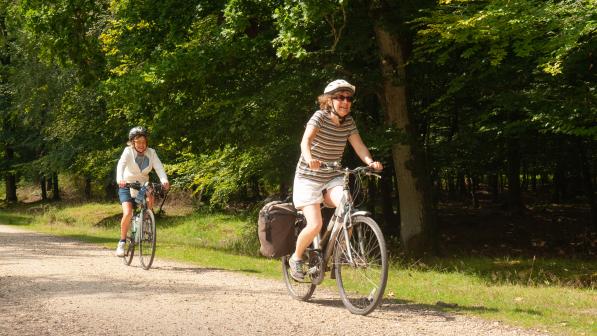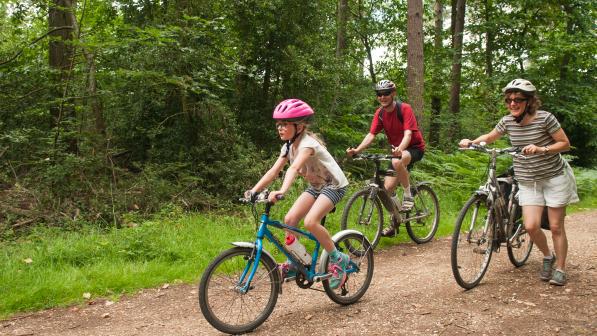How cycling can improve your mental health
The truth behind 'Blue Monday'
The idea behind Blue Monday came from a travel company in 2004 as a PR gimmick to sell more holidays. Cliff Arnall, a former tutor at the Centre for Lifelong Learning at Cardiff University claimed to have formulated an equation to work out the most depressing day of the year. The equation considered things like weather, debt, the time since Christmas and failing our new year resolutions.
The formula he created actually has no scientific basis and has been widely debunked by scientists and mental-health experts, and even Cliff himself has apologised for coining the term.
Perhaps the true meaning of Blue Monday is that we all have mental health and that there are steps that we can take on every day of the year to try and protect it
Dr Antonis Kousoulis, Mental Health Foundation
In 2016, the mental-health charity Mind launched the #BlueAnyDay campaign to dispel the Blue Monday myth and remind people that depression is a serious condition that can affect people on any day.
Mind’s head of information, Stephen Buckley, said: “1 in 6 people will experience depression during their life.
“There is no credible evidence to suggest that one day in particular can increase the risk of people feeling depressed. There are of course certain things that may make people feel down at this time of year, such as post-Christmas financial strains, broken New Year’s resolutions, bad weather and short daylight hours. However, depression is not just a one-day event.”
Dr Antonis Kousoulis, former director for England and Wales at the Mental Health Foundation, wrote in 2021: “Perhaps the true meaning of Blue Monday is that we all have mental health and that there are steps that we can take on every day of the year to try and protect it.”

The impact of exercise on our mental health
The importance of exercise is often underestimated by individuals and even some health care professionals.
Aerobic exercises – including cycling – have been proven to reduce anxiety and depression. Exercise improves your mood because it has several significant impacts on your brain.
When you exercise and your heart rate increases, more oxygen is pumped to your brain which has been shown to help manage anxiety and depression.
Endorphins and other mood-enhancing chemicals such as serotonin and dopamine are also released which all help to make us feel more positive.
Research suggests these improvements may have longer lasting effects too. Regular exercise can actually generate new neurons (cells that transmit information to the nervous system) in the brain which can lead to enhanced memory, improved mood and cognitive function, and learning capabilities.

Cycle your way to wellbeing
NHS physical activity guidelines state that we should do some kind of physical activity that raises our heart rate for 30 minutes, five times a week, or several short sessions of vigorous intensity activity. If you're new to exercise you should build up slowly. The message is, any activity is better than none.
The most important thing is to find something, such as cycling, that you enjoy.
One of the many people who have chosen cycling as one of their ways to improve their mental health and wellbeing is Harrison Read.
Harrison began cycling during lockdown and after seeing the benefits to his own mental health he decided to make a documentary to share his own journey and discuss with others how cycling has helped them.
Getting started
- Anything is better than nothing: you don't need to start off cycling for 30 minutes every day. Why not start off by doing 5-10 minutes and slowly increase over time.
- Be kind to yourself: When we're tired, feeling anxious, depressed or low, it can be extremely difficult to be motivated to exercise. Even though research shows it can improve our mood, these obstacles can be overwhelming, so start small and don't set yourself big goals. Set achievable targets and build them up over time.
- Celebrate your achievements: Increase your motivation by giving yourself a treat for exercising. This could be anything, a soak in the bath, a cup of soothing hot chocolate.
- Make it social: Exercising with others can make it much easier to stick with and can make it more enjoyable. Ask a family member or friend to join you, or consider joining a Cycling UK group.
- Need a helping hand? A Cycling UK membership is one way to help get you started. You’ll get support, advice and tips all year round on ways to enjoy cycling more, as well as third-party insurance and discounts on selected outdoors and cycling retailers. Take advantage of our special offer of a full 12-month membership for the price of just 9 months.
Additional support
If you need additional support for your mental health speak to your GP, contact Mind for information or the Samaritans if you want to talk.









